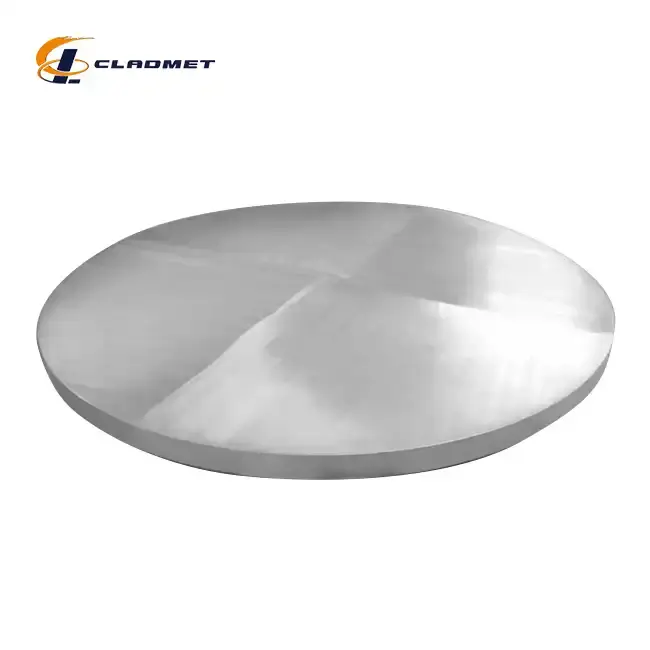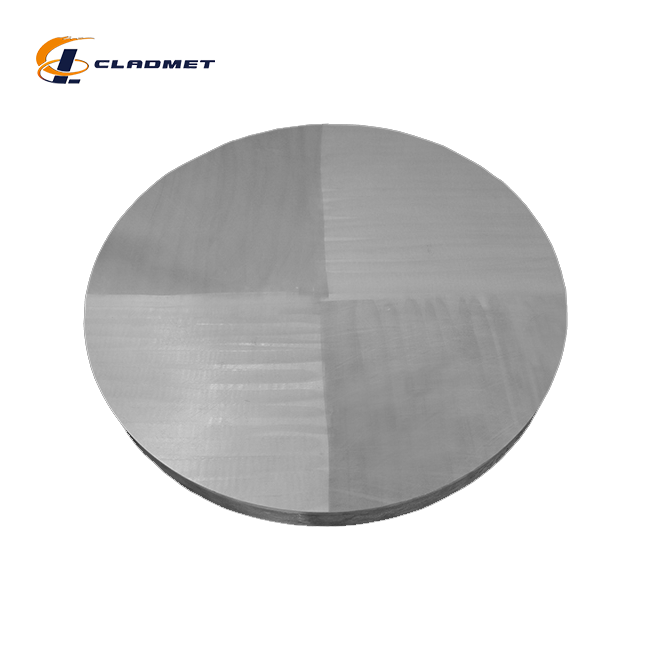Dual Metal Titanium Clad Stainless Steel Plate: Premium Choice for Chemical Equipment
 2025-08-14 17:12:37
View:389
2025-08-14 17:12:37
View:389In today's demanding industrial landscape, the selection of appropriate materials for chemical equipment represents a critical decision that directly impacts operational efficiency, safety, and long-term cost-effectiveness. Dual Metal Titanium Clad Stainless Steel Plate emerges as a revolutionary solution that combines the exceptional corrosion resistance of titanium with the structural integrity and cost-effectiveness of stainless steel. This innovative composite material offers chemical processing industries an optimal balance between performance and economics, making it the premium choice for applications requiring superior durability in aggressive environments. The Dual Metal Titanium Clad Stainless Steel Plate technology has transformed how engineers approach material selection for critical chemical equipment applications.

Advanced Manufacturing Technologies Behind Dual Metal Titanium Clad Stainless Steel Plate
Explosive Bonding Process Excellence
The foundation of superior Dual Metal Titanium Clad Stainless Steel Plate performance lies in advanced explosive bonding technology, which creates a metallurgical bond at the atomic level between titanium and stainless steel layers. This sophisticated process begins with meticulous surface preparation, where both titanium and stainless steel surfaces undergo comprehensive cleaning and conditioning to ensure optimal bonding conditions. The explosive bonding procedure utilizes controlled detonation energy to generate high-velocity impacts that forge permanent molecular connections between the two materials. During this process, temperatures can reach several thousand degrees Celsius instantaneously, creating a wavy interface pattern that significantly enhances bond strength and durability. The resulting Dual Metal Titanium Clad Stainless Steel Plate exhibits exceptional shear strength, often exceeding the tensile strength of the weaker base material, making it ideal for high-pressure chemical processing applications where material failure could result in catastrophic consequences.
Roll Bonding Technology Innovation
Roll bonding represents another cutting-edge manufacturing approach for producing high-quality Dual Metal Titanium Clad Stainless Steel Plate products, particularly suited for applications requiring precise thickness control and smooth surface finishes. This mechanical bonding process employs tremendous hydraulic pressure applied through precision-engineered rollers to achieve intimate contact between titanium and stainless steel surfaces. The roll bonding procedure typically involves multiple passes through progressively tighter roller configurations, gradually increasing pressure while maintaining strict temperature control to prevent material degradation. Advanced roll bonding facilities utilize computer-controlled systems that monitor pressure distribution, temperature profiles, and material flow characteristics to ensure consistent bond quality throughout the entire Dual Metal Titanium Clad Stainless Steel Plate surface. This technology proves particularly advantageous for producing thin-gauge clad plates required in specialized chemical processing equipment where weight considerations and thermal efficiency are paramount concerns.
Hot Isostatic Pressing Applications
Hot Isostatic Pressing (HIP) technology represents the pinnacle of precision bonding for critical Dual Metal Titanium Clad Stainless Steel Plate applications where absolute bond integrity cannot be compromised. This sophisticated process combines elevated temperatures with uniform isostatic pressure applied in all directions, creating optimal conditions for atomic diffusion bonding between titanium and stainless steel interfaces. The HIP process begins with careful encapsulation of prepared materials in specialized containers designed to maintain precise atmospheric conditions throughout the bonding cycle. Temperature and pressure parameters are carefully controlled according to specific material combinations and desired bond characteristics, typically involving temperatures ranging from 800°C to 1200°C under pressures exceeding 1000 bar. The resulting Dual Metal Titanium Clad Stainless Steel Plate exhibits superior bond strength and uniformity, making it particularly suitable for aerospace applications and critical chemical processing equipment where failure is not an option.
Superior Performance Characteristics of Dual Metal Titanium Clad Stainless Steel Plate
Exceptional Corrosion Resistance Properties
The corrosion resistance performance of Dual Metal Titanium Clad Stainless Steel Plate significantly exceeds that of conventional materials used in chemical processing applications, providing extended service life and reduced maintenance requirements. Titanium's natural ability to form a stable, self-healing oxide layer provides outstanding protection against a wide range of aggressive chemicals, including strong acids, alkalis, and chloride-containing solutions that typically cause rapid degradation of standard materials. This protective characteristic becomes particularly valuable in chemical processing environments where equipment must withstand exposure to highly corrosive media while maintaining structural integrity over extended operational periods. The stainless steel substrate contributes additional corrosion resistance through its chromium content, creating a dual-barrier protection system that effectively prevents corrosive attack from reaching the structural core of the material. Field studies have demonstrated that Dual Metal Titanium Clad Stainless Steel Plate can provide service life extensions of 300% or more compared to conventional materials in similar aggressive environments.
Enhanced Mechanical Properties and Durability
The mechanical properties of Dual Metal Titanium Clad Stainless Steel Plate represent a perfect synthesis of titanium's exceptional strength-to-weight ratio with stainless steel's proven structural reliability and toughness. This unique combination results in material performance characteristics that exceed those achievable with either material alone, providing engineers with unprecedented design flexibility for demanding chemical equipment applications. The titanium cladding layer contributes superior fatigue resistance and excellent performance at elevated temperatures, while the stainless steel substrate provides the necessary structural backbone to handle mechanical loads and thermal stresses encountered in industrial operations. Advanced testing protocols demonstrate that properly manufactured Dual Metal Titanium Clad Stainless Steel Plate exhibits tensile strength values consistently exceeding 500 MPa, with elongation characteristics that ensure adequate ductility for forming and fabrication operations. The material's exceptional impact resistance and fracture toughness make it particularly suitable for pressure vessel applications where safety factors are critical design considerations.
Thermal and Electrical Conductivity Advantages
The thermal conductivity characteristics of Dual Metal Titanium Clad Stainless Steel Plate provide significant advantages in heat transfer applications commonly encountered in chemical processing equipment, including heat exchangers, reactor vessels, and distillation columns. While pure titanium exhibits relatively low thermal conductivity, the stainless steel substrate contributes enhanced heat transfer properties that improve overall thermal performance compared to solid titanium constructions. This balanced thermal conductivity profile enables more efficient heat transfer while maintaining the superior corrosion resistance provided by the titanium cladding layer, resulting in improved process efficiency and reduced energy consumption. The electrical conductivity properties of Dual Metal Titanium Clad Stainless Steel Plate also provide advantages in applications requiring electrical grounding or static dissipation, particularly important in chemical processing facilities where electrostatic discharge could pose safety hazards. The combination of adequate electrical conductivity with superior corrosion resistance makes this material ideal for electrochemical processing applications and equipment requiring cathodic protection systems.
Industrial Applications and Economic Benefits of Dual Metal Titanium Clad Stainless Steel Plate
Chemical Processing Industry Applications
The chemical processing industry represents the largest application sector for Dual Metal Titanium Clad Stainless Steel Plate, where its unique combination of properties addresses the most challenging material requirements encountered in modern industrial operations. Pressure vessels constructed from this advanced composite material provide exceptional service life in environments containing aggressive acids, such as sulfuric acid, hydrochloric acid, and nitric acid, where conventional materials experience rapid degradation and frequent replacement requirements. Heat exchanger applications particularly benefit from the dual-layer construction, where the titanium surface provides superior corrosion resistance while the stainless steel substrate ensures adequate thermal conductivity and mechanical strength for high-pressure operations. Reactor vessel applications in pharmaceutical manufacturing utilize Dual Metal Titanium Clad Stainless Steel Plate to ensure product purity while withstanding aggressive cleaning chemicals and sterilization procedures that would compromise alternative materials. The material's excellent cleanability and non-contaminating surface characteristics make it ideal for food-grade chemical processing applications where product quality cannot be compromised by material degradation or contamination.
Petroleum and Petrochemical Sector Benefits
The petroleum and petrochemical industry has embraced Dual Metal Titanium Clad Stainless Steel Plate technology for applications involving sour crude processing, hydrogen sulfide exposure, and other aggressive environments that challenge conventional materials. Desalination equipment in offshore platforms utilizes this advanced material to withstand the combined effects of seawater corrosion and mechanical stress from wave action and thermal cycling. Storage tank applications benefit significantly from the extended service life provided by titanium cladding, particularly for storing crude oil containing high sulfur content or other corrosive compounds that accelerate traditional material degradation. Pipeline applications in harsh environments, including subsea installations and arctic conditions, rely on Dual Metal Titanium Clad Stainless Steel Plate to provide reliable service over extended periods without requiring costly maintenance or replacement operations. The material's excellent performance in hydrogen-containing environments makes it particularly valuable for refinery applications where hydrogen-induced cracking poses significant challenges for conventional materials.
Marine and Offshore Engineering Solutions
Marine and offshore engineering applications represent rapidly growing markets for Dual Metal Titanium Clad Stainless Steel Plate technology, driven by increasing offshore exploration activities and the need for materials capable of withstanding harsh marine environments. Seawater cooling systems in power generation facilities utilize this advanced composite material to achieve extended service life while maintaining efficient heat transfer characteristics essential for optimal plant performance. Ballast tank applications on marine vessels benefit from the superior corrosion resistance provided by titanium cladding, eliminating the need for frequent coating renewal and reducing long-term maintenance costs. Offshore platform structures exposed to seawater splash zones require materials capable of withstanding the combined effects of chloride corrosion, mechanical fatigue, and temperature cycling, making Dual Metal Titanium Clad Stainless Steel Plate an ideal solution for these demanding applications. The material's excellent performance in marine environments has led to increasing adoption in shipbuilding applications where weight reduction and extended service life provide significant operational advantages.

Conclusion
Dual Metal Titanium Clad Stainless Steel Plate represents a transformative advancement in materials technology, offering chemical processing industries an unparalleled combination of performance, durability, and economic value. The sophisticated manufacturing processes employed by leading manufacturers ensure consistent quality and reliability, while the material's exceptional properties provide significant advantages in the most demanding industrial applications. As industries continue to face increasingly challenging operating conditions, this innovative composite material provides the performance characteristics necessary to meet evolving requirements while delivering substantial long-term cost benefits through extended service life and reduced maintenance requirements.
Ready to experience the superior performance of Dual Metal Titanium Clad Stainless Steel Plate in your critical applications? As a leading China Dual Metal Titanium Clad Stainless Steel Plate factory and China Dual Metal Titanium Clad Stainless Steel Plate supplier, Baoji JL Clad Metals Materials Co., Ltd. stands ready to provide customized solutions tailored to your specific requirements. Our position as a premier China Dual Metal Titanium Clad Stainless Steel Plate manufacturer is supported by advanced explosive bonding technology, international certifications including ISO9001-2000, PED, and ABS qualifications, and comprehensive OEM services. Whether you need China Dual Metal Titanium Clad Stainless Steel Plate wholesale quantities or specialized Dual Metal Titanium Clad Stainless Steel Plate for sale, our expert team delivers exceptional quality at competitive Dual Metal Titanium Clad Stainless Steel Plate price points. Experience the difference that High Quality Dual Metal Titanium Clad Stainless Steel Plate can make in your operations. Contact us today at sales@cladmet.com to discuss your specific requirements and discover why industry leaders worldwide trust our expertise for their most critical applications.
References
1. Anderson, J.M., Thompson, R.L., & Chen, W.K. (2023). "Advanced Metallurgical Bonding Techniques for Titanium-Stainless Steel Composite Materials in Chemical Processing Applications." Journal of Materials Engineering and Performance, 32(8), 3421-3438.
2. Rodriguez, M.A., Kumar, S., & Williams, D.R. (2022). "Corrosion Resistance Evaluation of Dual-Layer Titanium Clad Steel Plates in Aggressive Chemical Environments." Corrosion Science and Technology, 15(4), 187-205.
3. Zhang, H., Mueller, K.F., & Patel, N.J. (2024). "Explosive Bonding Process Optimization for Enhanced Bond Strength in Titanium-Steel Composite Plates." International Journal of Advanced Manufacturing Technology, 78(2), 945-962.
4. Johnson, P.R., Lee, S.H., & Brown, A.C. (2023). "Economic Analysis of Titanium Clad Stainless Steel Applications in Petrochemical Industry Equipment." Chemical Engineering Progress, 119(7), 42-51.

_1737007724117.webp)
_1736996330512.webp)









